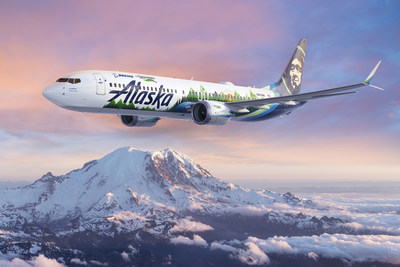- ecoDemonstrator 737 MAX 9 will test advanced technologies to cut emissions, reduce noise and recycle carbon composites
- Boeing ecoDemonstrator programme takes promising technologies out of the lab to test in the air
Boeing and Alaska Airlines announced today they are partnering on the latest Boeing ecoDemonstrator programme and will flight test about 20 technologies on a new 737 MAX 9 to enhance the safety and sustainability of air travel.

In flights beginning this summer, Boeing and Alaska will test a new halon-free fire-extinguishing agent that significantly reduces effects on the ozone layer, evaluate an engine nacelle designed to reduce noise and assess cabin sidewalls made from recycled material, among other projects.
“We have a long history of working with Boeing to advance aviation technology, safety and fuel efficiency,” said Diana Birkett Rakow, Alaska Airlines’ vice president, public affairs and sustainability. “Alaska Airlines flies to some of the most beautiful and geographically diverse regions in the world and we are committed to finding ways to reduce climate impacts across our network. This work with Boeing to accelerate innovation on the ecoDemonstrator programme enables us to contribute to a more sustainable future for our global community.”
Since 2012, the ecoDemonstrator programme has accelerated innovation by taking nearly 200 promising technologies out of the lab and testing them in the air to address challenges for the aviation industry and improve the passenger experience.
“Boeing is committed to continually improve air safety and the environmental performance of our products,” said Stan Deal, Boeing Commercial Airplanes president and CEO. “We’re proud to collaborate with our hometown customer and other partners around the world this year to make flying more sustainable.”
In five months of ecoDemonstrator flight tests, Boeing and Alaska will work with nine other partners to test new technologies. After tests are complete, the aeroplane will be configured for passenger service and delivered to Alaska. The programme’s technologies include:
- Testing a new fire extinguishing agent for aircraft that significantly reduces effects on the ozone layer. This material is intended to replace Halon 1301, which is no longer being produced.
- Collaborating with the U.S. National Oceanic and Atmospheric Administration to measure greenhouse-gas levels in the atmosphere to support the agency’s climate modelling and long-term forecasting.
- Evaluating acoustic lining concepts within the engine nacelle that may reduce noise on current engines and will inform designs for next-generation models.
- Recycling carbon composite material from Boeing 777X wing production into a cabin sidewall panel. This durable, light material would reduce fuel use and carbon emissions, and supports Boeing’s goals for sustainable manufacturing.
Boeing’s current and future aeroplanes leverage a number of technologies evaluated in previous ecoDemonstrator testing, including:
- Advanced Technology winglets on the 737 MAX family that reduce fuel use and emissions.
- iPad apps that provide real-time weather and other data to pilots, improving fuel efficiency and reducing CO2 emissions. These apps complement digital analytics services Boeing offers to help airlines optimize fleet utilisation.
- A camera system on the new 777X that will enhance safety by helping pilots avoid obstacles on the ground.
“Boeing put additional emphasis on sustainability in 2020 to align with our stakeholder and business priorities as well as our values,” Boeing Chief Sustainability Officer Chris Raymond said. “Through our collaboration with industry partners, the ecoDemonstrator programme is a great example of our commitment to work together to make flying safer and more sustainable for current and future generations.”
ecoDemonstrator test flights are flown on a blend of petroleum-based and sustainable aviation fuel. SAF is in regular use today, reduces life-cycle CO2 emissions by up to 80%, and offers the most immediate and greatest potential to reduce emissions over the next 20 to 30 years in all commercial aviation markets.
In January this year, Boeing committed to making sure its commercial aeroplanes are capable and certified to fly on 100% SAF by 2030. The company also plans to work with regulatory authorities and across the industry to raise the current 50% blending limit for expanded use of SAF. Boeing’s 2018 ecoDemonstrator 777 Freighter made history as the world’s first commercial airliner to fly on 100% sustainable fuel. With the global alliance and Alaska Airlines’ additional partners, guests can travel to more than 1,000 destinations on more than 20 airlines while earning and redeeming miles on flights to locations around the world.
SEATTLE, June 3, 2021 /PRNewswire/



